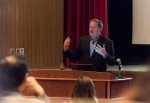A visiting professor introduced potential solutions to the issue of homelessness in Los Angeles at an event Monday evening.
Dennis Culhane, a professor at the University of Pennsylvania School of Social Policy and Practice, spoke at a lecture at the UCLA Semel Institute for Neuroscience and Human Behavior.
The lecture, titled “Meeting the Challenge of Homelessness,” was part of the weeklong series “UCLA & Homelessness: See. Study. Solve.,” which was organized to address homelessness in Los Angeles and showcase research on the issue.
Culhane, who will speak at other events in the series, said Los Angeles faces unique challenges because it has seen an increase in its homelessness rate while the national rate of homelessness has decreased. He also said that homelessness is a big problem in Los Angeles because of the high demand and prices of housing.
Culhane showed the decreasing trends of homelessness on the East Coast and talked about effective intervention methods to reduce homelessness in his presentation, such as direct intervention. Direct intervention methods include housing voucher programs in which homeless individuals get direct support from social workers.
He said unsheltered homelessness is a problem especially in California because homeless individuals are less likely to choose to reside in homeless shelters because of the warmer climate, whereas colder winters on the East Coast prompt more homeless individuals to seek out shelters.
“What is most distinct about it is that 75 percent (who) are living outside are unsheltered, whereas in (New York) only 5 percent are unsheltered,” Culhane said.
Randall Kuhn, an associate professor in the department of community health sciences who organized the weeklong series, said he hopes to showcase research in homelessness and to further engage students and faculty in reducing homelessness in the Los Angeles area.
“(The) homelessness crisis has been going on a long time,” Kuhn said, “(This is an) extraordinary effort to take ownership of this problem so (this is an) exciting time.”
Kuhn said homelessness is not prevalent in the Westwood area because the population is wealthier than areas such as Venice and downtown, which have larger homeless populations.
“(You tend to be) homeless near where you … (were) housed. Poverty is less on the west side,” Kuhn said. “It is true everywhere.”
Angelica Lewis, a graduate student in public health, said she attended the event because she wanted to learn more about homelessness.
“I’m a first-year student and it’s definitely opened up my eyes to bigger problems outside the clinical world,” Lewis said.
Lewis said she wants to help homeless veterans over the summer and hoped the event would teach her how.
Kuhn said he thinks more efforts to help homeless people should be made, as many people have gone through homelessness and it does not have to be a permanent condition.
“To a greater extent, homelessness is a poverty issue,” Kuhn said. “Most people enter because they are poor. (But) what happens next is what really matters.”
